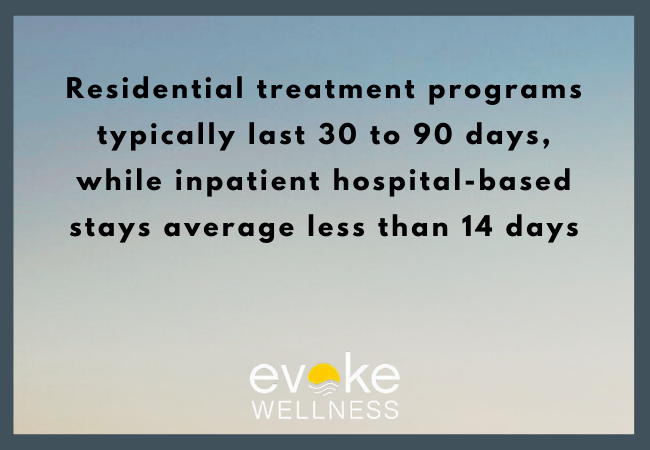Understanding the differences between residential rehab and inpatient treatment is crucial for those seeking the best care for addiction or mental health conditions. While both provide structured, immersive care, they serve distinct purposes and cater to different needs.
When seeking treatment for mental health or substance use disorders, understanding your options can feel overwhelming—especially when the terms “residential rehab” and “inpatient rehab” are often used interchangeably. While both programs offer structured, intensive care in a live-in setting, there are key differences between the two that can significantly impact your recovery journey. This guide breaks down the distinctions between these two levels of care so you can make informed decisions about your next step toward recovery.
What is Residential Rehab?
Residential rehab is a long-term treatment program designed for individuals who require structured care but do not need intensive medical supervision. These programs provide a home-like environment where patients can focus on recovery while participating in therapy, skill-building, and holistic wellness activities. A residential rehab center in Florida offers a supportive setting that encourages personal growth and long-term recovery.
Key Features of Residential Rehab:
-
24/7 support in a non-hospital, home-like setting
-
Individual and group therapy
-
Mental health and addiction education
-
Life skills training and relapse prevention
-
Holistic therapies (e.g., yoga, meditation, nutrition)
-
Average length of stay: 30–90 days or more
What is Inpatient Rehab?
Inpatient rehab, often referred to as acute or intensive treatment, provides 24/7 medical and psychological support. It is designed for individuals with severe substance use disorders or co-occurring mental health conditions that require immediate medical attention. Patients receive round-the-clock care to stabilize their condition before transitioning to lower levels of care.
Key Features of Inpatient Rehab:
-
24/7 medical and psychiatric supervision
-
Crisis stabilization
-
Medication management
-
Frequent assessments by physicians and psychiatrists
-
Focus on safety and symptom stabilization
Key Differences Between Residential and Inpatient Rehab
1. Level of Medical Supervision
- Inpatient rehab is highly structured with constant medical monitoring, making it ideal for those undergoing detox or with severe health complications.
- Residential rehab provides structured care but does not require 24/7 medical supervision.
2. Duration of Treatment
- Inpatient rehab is typically short-term (30–90 days) and focuses on immediate stabilization.
- Residential rehab is long-term, often lasting several months to a year, allowing patients to build sustainable recovery habits.
3. Therapeutic Approach
- Inpatient rehab prioritizes medical stabilization, detox, and immediate psychiatric care.
- Residential rehab emphasizes therapy, relapse prevention, and skill-building for long-term success.
Inpatient vs. Residential Rehab: Key Differences at a Glance
| Category | Inpatient Rehab | Residential Rehab |
|---|---|---|
| Level of Care | Acute, medically intensive | Sub-acute, therapeutic and supportive |
| Setting | Hospital or clinical environment | Home-like, structured recovery center |
| Focus | Stabilization and safety | Long-term healing and behavior change |
| Length of Stay | Short-term (5–14 days) | Medium-to-long term (30–90+ days) |
| Medical Oversight | Constant, medical staff-led | Clinical oversight with therapeutic staff |
| Programming | Medication, crisis management | Therapy, skill-building, relapse prevention |
| Best For | Acute mental health or detox crisis | Continued recovery, co-occurring disorder management |
Who Should Choose Residential Rehab?
It is ideal for individuals who:
- Have completed inpatient treatment and need continued support.
- Struggle with addiction but do not require medical detox.
- Need a stable, structured environment to focus on long-term recovery.
- Have experienced multiple relapses and need extended care.
Who Should Choose Inpatient Rehab?
I is best suited for individuals who:
- Need medical detox and intensive care.
- Have severe withdrawal symptoms or co-occurring health conditions.
- Are at risk of harming themselves or others.
- Have attempted lower levels of care but require a higher level of support.
Shared Benefits of Both Levels of Care
Despite their differences, both inpatient and residential rehab offer critical advantages over outpatient treatment, including:
-
24/7 support and supervision
-
Medication management and psychiatric care
-
Access to individual, group, and family therapy
-
Safe, substance-free environments
-
Connection to step-down programs like PHP or IOP
Importance of a Mental Health Treatment Center in Florida
Many individuals seeking addiction treatment also struggle with mental health disorders such as depression, anxiety, or PTSD. A mental health treatment center in Florida provides dual-diagnosis treatment, addressing both addiction and mental health issues simultaneously. This approach improves recovery outcomes and reduces relapse risks.
Research and Statistics on Treatment Outcomes
- According to the National Institute on Drug Abuse (NIDA), long-term rehab programs significantly increase the chances of maintaining sobriety compared to shorter treatment durations.
- The National Alliance on Mental Illness (NAMI) reports that 50% of individuals with substance use disorders also have a co-occurring mental health condition.
- Studies indicate that patients who engage in residential treatment for at least 90 days have higher long-term recovery rates than those in shorter programs.
Overcoming Stigma and Embracing Recovery
Many people hesitate to seek treatment due to stigma. However, addiction is a medical condition, not a moral failing. Education and advocacy play crucial roles in encouraging individuals to pursue treatment without fear of judgment.
Choosing the Right Program for Your Needs
Selecting between residential rehab and inpatient rehab depends on the severity of the condition, medical history, and personal circumstances. A thorough assessment by medical professionals can help determine the best treatment plan.
Conclusion
Understanding the difference between inpatient and residential rehab is more than semantics—it’s about choosing the right level of care at the right time. At Evoke Wellness, we believe in meeting people where they are—whether they need immediate stabilization or are ready for deep, sustained therapeutic work. No matter your path, we’re here to support you every step of the way with compassion, clinical expertise, and personalized care.
If you or a loved one is struggling with addiction or mental health challenges, finding the right treatment program is essential. At Evoke Wellness, we offer compassionate care tailored to your unique needs. Call us today at 866.429.2960 or contact us to begin your recovery journey.
Frequently Asked Questions (FAQs)
What is the main difference between residential and inpatient rehab?
Inpatient rehab provides 24/7 medical supervision, while residential rehab offers a structured, home-like environment without constant medical monitoring.
How long do residential rehab programs last?
Most residential rehab programs last several months to a year, depending on individual needs and progress in recovery.
Is residential rehab covered by insurance?
Many insurance plans cover residential rehab, but coverage varies. It’s best to check with your provider and the rehab center for details.
Can I transition from inpatient rehab to residential rehab?
Yes, many individuals move from inpatient care to residential rehab for continued support and long-term recovery planning.
What should I bring to a residential rehab center?
Most residential rehab centers allow comfortable clothing, toiletries, and personal items. Restrictions may apply to electronics, outside food, and certain medications.



